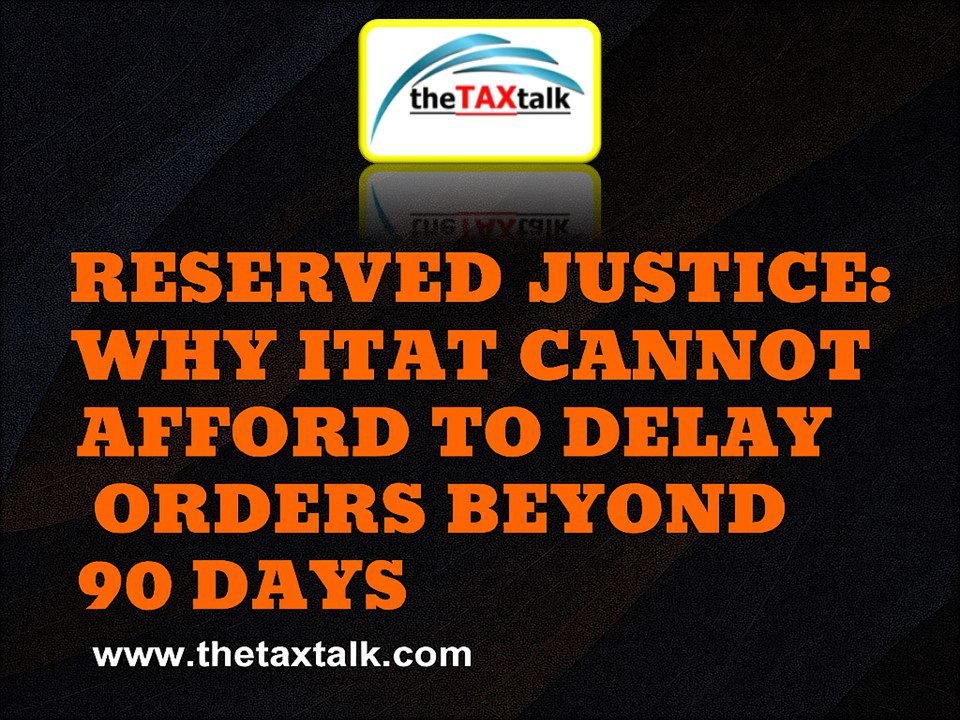![]()
Reserved Justice: Why ITAT Cannot Afford to Delay Orders Beyond 90 Days
In the world of taxation, deadlines are sacrosanct. Miss a due date and the taxpayer is slapped with interest, penalties, or worse. But what happens when the judiciary itself fails to keep its own timeline? A recent controversy before the ITAT Special Bench involving the Cyprus tax treaty case has once again brought this uncomfortable question to the forefront.
The Special Bench had reserved its order way back in November 2022. Nearly a year later, instead of pronouncing judgment, the Bench has scheduled a so-called “clarificatory hearing” in November 2023. For tax professionals, this is not just unusual – it borders on the unprecedented.
Rule 34(5): The Clock That Never Ticks?
The Income Tax Appellate Tribunal Rules, 1963 are crystal clear in Rule 34(5): once a case is heard, the Bench should deliver its order within 90 days. The logic is simple – justice delayed is justice denied.
But here lies the paradox: while taxpayers are reminded to comply with deadlines under threat of law, judicial delays seem to escape with little more than academic criticism.
The Supreme Court’s Nudge: Anil Rai v. State of Bihar
This is not the first time the judiciary has been reminded of the importance of timely pronouncements. In the landmark case of Anil Rai v. State of Bihar (2001) 7 SCC 318, the Hon’ble Supreme Court issued clear guidelines:
• If a judgment is not delivered within two months, the Chief Justice should remind the judge concerned.
• If the delay exceeds six months, parties can move an application to withdraw the case from that Bench and have it reassigned.
These directions are not mere advisory notes; they are meant to preserve the very credibility of the judicial system.
Bombay High Court’s Caution
The Bombay High Court in Prabhatai v. Chimote and Sons (2016) also dealt with this issue. While the Court observed that “mere unexplained delay” in delivering judgments is not automatically fatal, it strongly reiterated that the Supreme Court’s Anil Rai guidelines must be followed strictly.
A Common-Sense Solution
Legal commentators suggest a pragmatic remedy: if an order cannot be delivered within 90 days from the conclusion of hearings, the case should be released and placed before another Bench. Such a move would prevent the unhealthy practice of “reserved orders” stretching endlessly, sometimes for a year or more.
Why This Matters
The Cyprus treaty case may seem niche, buried deep in the technical trenches of international taxation. But the principle at stake is universal: timely justice is the lifeblood of any democracy.
If tribunals – the very institutions meant to provide speedy relief to taxpayers – start sitting on judgments for months or even years, faith in the system will inevitably corrode.
Final Word
Taxpayers are compelled to live under the constant tyranny of deadlines. It is only fair that the judiciary respects its own. As the Hon’ble Supreme Court has said time and again, judgments delayed are justice denied.
Perhaps it is time for the ITAT to adopt a stricter practice — if you cannot deliver an order within the statutory timeframe, let another Bench do so. After all, the cause of justice is too important to be kept waiting in a dusty file marked “reserved.”


